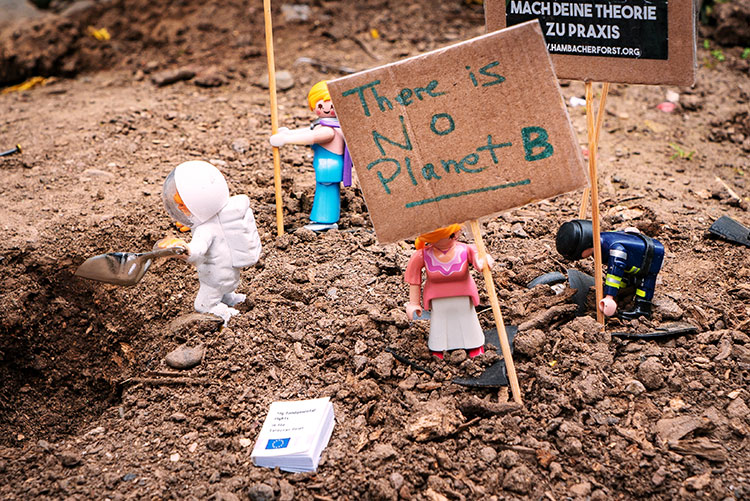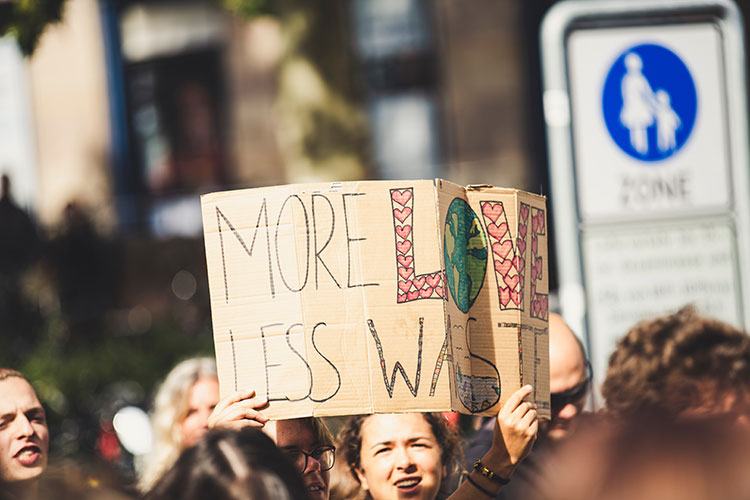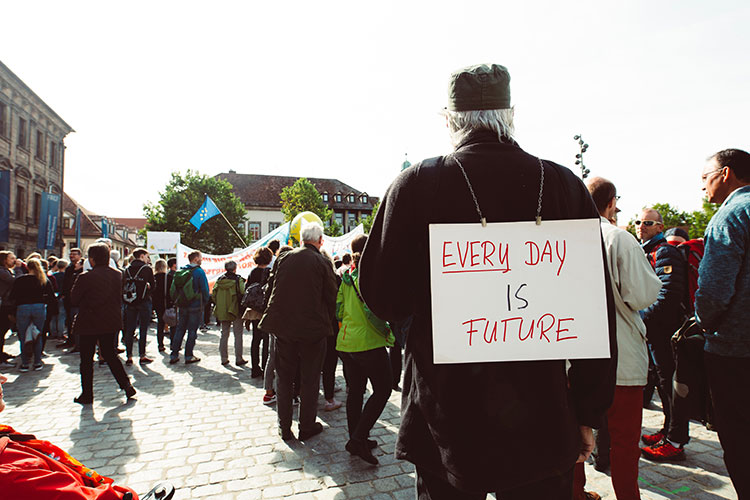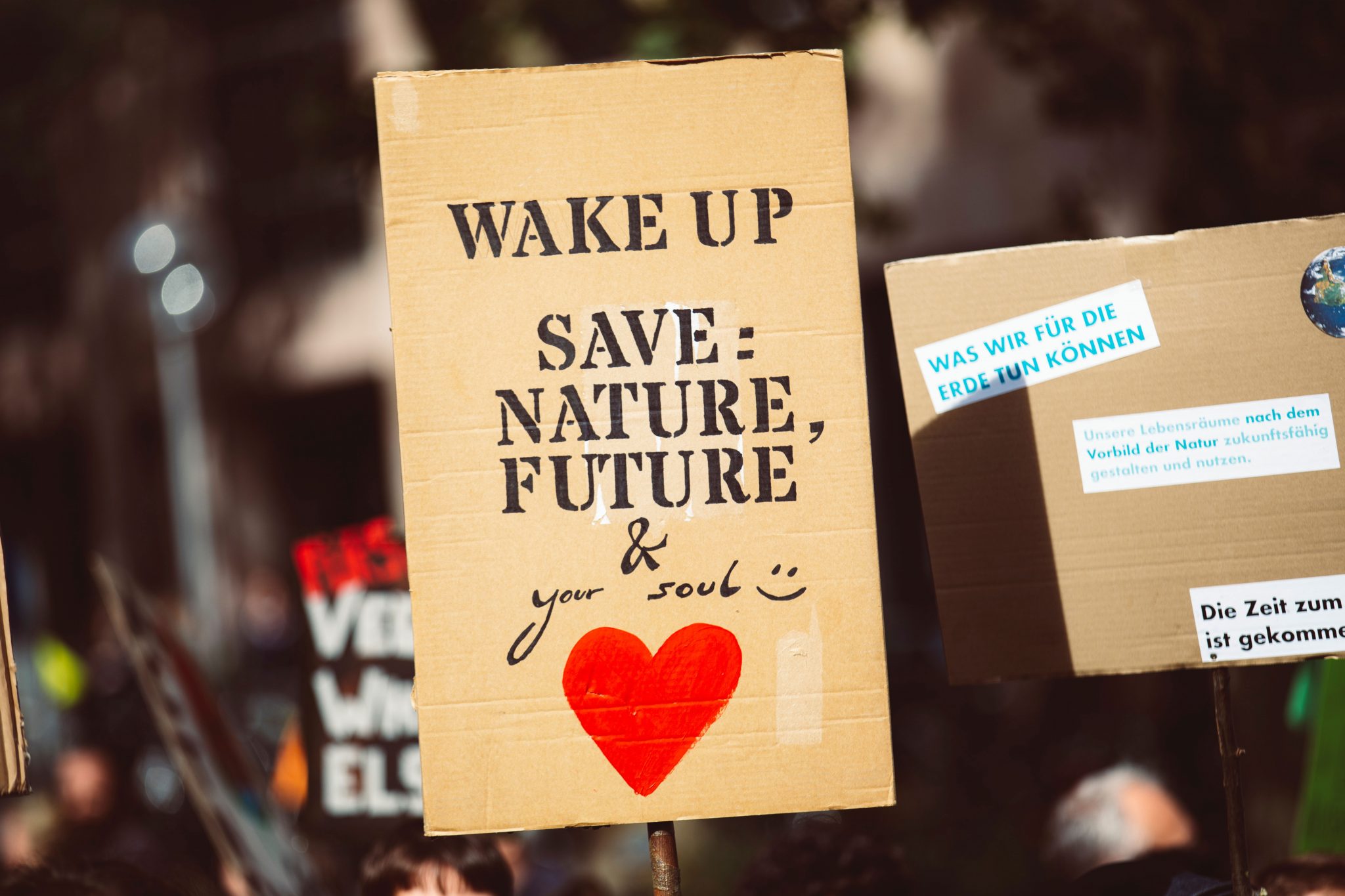Natasha Jacob, studying for a BSc in Human Ecology with a Year in Professional Practice writes the third in a series of blogs about how to combat ‘eco anxiety’.
We recently started a series of features on eco-anxiety because it is too much to tackle in one sitting. We have already looked at the importance of understanding what eco-anxiety is and the need for a move from fear to positivity and hope. But where do you start?
I recently attended an eco-anxiety classroom run by Clover Hogan‘s Force of Nature, a collective of young environmentalists that focus on exactly this issue: the title of the session was ‘Moving from Anxiety to Agency’. I took detailed notes so that I could share what I learned – however nothing will replace the benefit of joining in a classroom yourself! Over the course of this article I am going to present questions to you that are important to reflect on, so be sure to grab a pen and paper.
Let’s start from the very beginning, break this bad boy down into digestible chunks and gain some helpful insight, tangible tools and, most importantly, some serious agency. As we all know, the familiar physical and emotional symptoms of eco-anxiety and eco-phobia can be debilitating. Eco-anxiety is the feelings of fear, stress and despair that result from a knowledge of the climate crisis. Eco-phobia is the actual shutdown that your body experiences in response to the climate crisis. A combination of these can result in a person that is very distressed, burnt out and feels paralysed in fear, resulting in a feeling of helplessness, that they are unable to be the activist they want to be. Sounds familiar? Me too. So, what do we need to consider when we experience this?

COVID
Though the anxiety induced by COVID could almost be seen as separate to eco-anxiety, it is actually very much related. What is happening in your external environment directly impacts what’s happening internally: in your mind and psyche. These externalities will affect how empowered you feel to make a difference in the world. A vital start to gaining agency and moving the power away from external events is through reflection.
Give yourself a minute. Create a quiet space. The first questions I want you to reflect on are:
- What personal experience of lockdown would I like to bring forward?
- What stood out as an important life lesson?
- And what would I want to leave behind?
For me, I realised how, pre-COVID, I am often awful about looking after my mental, physical, emotional and spiritual health. I allow myself to perpetuate a capitalist productivity cycle of working 110%. Because I am not a robot, that leads to me burning out at 100%, with 10% left for me to cry, collect the scraps of myself over a few months and eventually get to a place where I can efficiently work again to some extent. In case you weren’t sure – that is not what sustainability looks like. So, my conclusion was I need and want to slow down. I want to be more intentional about what I’m spending my time on. But, overarchingly, I want to be a better friend to my mind, body and soul because I’m the one responsible for that. It’s the only way I’m going to truly accomplish the things I want to achieve in this life in my own authentic way.

Why reflection is important
We often don’t give our brains enough credit, not just for their brilliance but their mischievousness. When we don’t have the answers to everything – as we certainly don’t with the Climate Crisis – we often fill in the blanks with self-limiting beliefs. We can tell ourselves that anything we do won’t make a difference because we are just tiny specks on a big planet.
This leads to the absence of thinking systemically. The reality of life is that you, as an individual, are part of much wider, complex systems that encompass those you live with, your town, country, the energy systems that each of these rely on to function, the governmental authorities in place, laws, policies, and the huge corporations, of which 100 are responsible for 71% of all emissions (CPD Worldwide, 2017). Your impact on the world, the way you live and your interactions with others, has ripple effects. We are all connected to a web of systems in a way that is far more complex than we can imagine.
This leads us back to self-limiting beliefs. Due to the apparent complexity of the world we live in, it’s easy to believe that you’re too irrelevant to actually make a difference. That nothing will ever change and that, as hard as you try, your place in the story is not a significant one. Someone else will be the one to make a difference.
Though this may not be your exact experience, I’m sure it will still resonate with you.
So, again, we need to reflect, rethink and reset. Back out with the pen and paper. I want you to reflect on these three things. Consider your problems at large in terms of wanting to take action:
- What makes you feel small?
- What feelings stop you taking action?
- Is there a time you have taken action? How did it feel?
Our expectations, attitudes and decisions are all affected by the stories we tell ourselves. Therefore, we need to rewrite these stories! Don’t try to beat your anxiety into submission, because the thing that upsets you the most is probably where you should take action. Focus on how and where to act. The reality is that, if you think of any problem, any broken system, there will be 100,000,000 solutions as to how to tackle it.
Impact comes from focus
Your impact in the world will come from you honing down what is important to you. These are often the things we’ll spend our own time researching or reading up on.
Use these questions to explore what your passions may be:
- What particularly strikes your nerves?
- If you could solve ONE thing, what would it be?
- How does this make you feel and why?
The most powerful tool you can take hold of is your individual and unique passion for justice in a particular area. The key is, the more focused on a particular issue or injustice you are, the more impactful you will be. The more agency you will have to make change. This is an exercise of listening to ourselves and what particularly resonates with our beings. Of utilising our unique talents and interests and seeing how they could be applied to these areas of focus. We need 100,000,000 different solutions to the climate crisis, so what will yours be?

Rewriting our stories
Finally, I want to end with an exercise that is key to rewriting our stories. Sit down, close your eyes and visualise that that very problem that strikes such a nerve with you has been solved! All the efforts that have gone into making a change have been effective.
- How do you feel?
- What do your relationships with those around you look like?
- How have others been positively affected?
- How do they now seem?
See the outcome and work backwards. We know change is possible because we see individuals making positive impacts on a daily basis. Tell yourself that you absolutely can make change, that you absolutely have agency, and be excited to discover what that will look like, how that will feel and what that will mean for others.
Check out the Force of Nature website, sign up for the eco-anxiety classroom and listen to Clover Hogan’s fantastic, varied podcast on Spotify (Force of Nature podcast).
Extinction Rebellion are also running a Trust the People programme about community activism, which may also be of interest.
Natasha Jacob is studying for a BSc in Human Ecology with a Year in Professional Practice.

